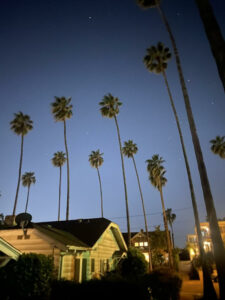
THE DINNER PARTY by Lizzi Sandell
From the dark spot under the jacaranda tree, I watched as the friends set the long wooden table. Inside the yellow window, the guests handled salad bowls and wine bottles and candles tilting precariously on ceramic stands. They were in a lamplight embrace, and I was in the dark spot under the jacaranda tree.
It was a blustery night, alive with possibility. Hot, dirt-rich air blew in from the desert and made the city wild. The dying palm trees swayed above the boulevards like dolls with too-heavy heads. Over in the beach towns, the brushfires raged, and the cremains of other people’s houses billowed down the coastline to settle above the city in poisonous patches.
I thought to leave when I saw two shadows drape across the lawn. I turned to find two guests, flammable with alcohol wrapped in brown paper and the rustle of Trader Joe’s bags. One had very white teeth as she sucked on the firefly-light of a vape pen, smiled, and said,
“Are you here for the dinner party?”
Affable, they did not wait for my response. Instead, they approached the door, knocking briefly before easing it open. I shrunk in the porchlight, then followed them over the threshold.
“Sorry, we’re late,” one called out intimately, as a woman in overalls appeared in the entrance hall. They all embraced intently, like animals collecting scents, then the guests removed their shoes in favor of the prickly friction of socks on floorboards.
“Nice to meet you, I’m Shula.” the host said to me, “It means flame.” The orange flecks in her irises flashed in the light as they met mine and I forgot my own name, but Shula was already gone. I removed my shoes and placed them with the others, which were strewn in incestuous piles.
In the next room, the friends let out a cacophony of greetings and I rushed to catch the last of the good graces. The women I arrived with surrendered their offerings and made their way towards the dinner table where the guests were arranged, drinking wine from a bottle with an abstract label.
I balked, considering for the first time that there’d be no place for me, but the guests squeezed together on mismatched chairs as if closeness was the most natural thing in the world.
I sat down among the body heat of strange thighs.
The party was in a large room that curved from bay window to backyard around an unlit fireplace that was black and open like a yawn. A large, modern tapestry hung across one wall where the television should have been. I tried to imagine a life so full that you didn’t need the reassuring drone of the close-and-distant voices from the television.
“Nice place, isn’t it?” said a woman whose sweat smelled like expensive hotel bathrooms. “Shula got a good price for it. She had to sign something because they said the ground might swallow it when the next big earthquake comes or something,” she shrugged. I looked at the shiny buckles on the woman’s leather loafers, contemplating that I would be tempted to mug her if I saw her in a 7-Eleven parking lot late at night.
Soon, Shula served the dinner on large sharing plates. It was made up of whole grilled fish—one dead eye staring into oblivion—and kale salad, and green tomatoes with burrata that fell dreamily through the gaps in my fork. I imagined Shula handling each ingredient with her clean, bare hands.
The warmth from her was swinger energy: a kind of touchy-feely friendliness that implied she could accidentally have sex with any of her friends at any moment and nobody would mind.
One man, a sommelier of sorts, filled up each wine glass evenly, and everybody waited for the next and the next sip with quiet reverence. “Can you feel the sediment?”
Across the table, there was blonde I recognized from the Internet whose face was as familiar as a close relative’s. She looked smaller and sadder up-close than on Instagram, where I was used to seeing her getting engaged, or thrilled over a croissant.
“This is how I want the food at my wedding,” she said. “Family-style.”
The kale stuck in my throat. For a moment, I was somewhere familiar, but cold, and all I could hear was the lonely clinking of crockery.
I was returned to the table by the lazy tones of the man on my left. “So, how do you know Channing and Isabel?” he asked, gesturing to the women I had walked in with.
They were across the table from us, hands absent-mindedly clasped together, and draped in organic fabrics—linen and cotton. Their slender arms were canvases for tiny, almost imperceptible tattoos. They looked like they’d grown there over time. Like holes in the bottom of a ship.
“Oberlin,” I guessed, aiming to match his degree of casualness, which was such that he might cease to exist entirely.
“Cool,” he said simply, then asked me what I’m doing now. I told him I was “figuring it out,” which seemed to be exactly what he expected me to say.
“You just have to figure out how to spend the time, between the coffee and the wine,” he said with a wink, and I smiled knowingly, without understanding what he meant. I observed the tendrils of his chest hair curl above the collar of his button-up and considered his apparent lack of agony when saying stupid things.
I studied the other guests around the table—the friends. Their consciously curated styles did little to hide their commonality. They were people who seemed like they’d never struggled to find a parking space.
I was separated from them merely by an accident of birth. They, born whole, with a wealth they called wellness. I, born crawling in my skin, born lonely. What was inside me was not evil or ugliness but a nothingness with outstretched arms.
I savored their proximity, and the tasty morsels of their untroubled conversations.
“I wanted to hike today but my allergies were insane,” said the Internet blonde.
“It’s the fires,” said Channing and Isabel in unison, rolling their eyes.
“Have you tried the new Erewhon smoothie? It’s randomly good,” said the blonde, apropos of nothing. “One day I want my own.”
Outside, the sky grew apocalyptic orange as the last of the red-mauve light died on the horizon. Inside, the guests grew ever more relaxed—more familiar with each other, more comfortable with themselves. There were eight guests in total, excluding me, who was not a guest but merely a ghost at a feast.
Someone had brought a special dessert in a cardboard box, and the guests helped themselves like hungry children. Afterwards, Shula suggested swimming. I imagined the guests together in warm water, half-naked and playful like prepubescent cousins, and I knew that it was time to leave.
The friends moved en masse, collecting each other’s plates and utensils and placing them on the kitchen island. In the flurry, I got close to Shula to ask if I could use her bathroom. She called me “angel” as she showed me down the hall. I thanked her, looking at her open face one final time.
I walked into the darkness in the direction that she indicated, but instead of going inside the small guest bathroom with black and white tiles, I went further—down and down the dark corridor where a door was agape like a mouth.
Inside Shula’s bedroom, I witnessed myself in the mirror. My eyes were shiny with wine. Like a river rat.
In a bedside drawer, there was an orange prescription cannister and I took mental note of the medication name. I found a small bottle of lubricant that was sticky to the touch. On a pin board, there were Polaroids of friends, some I recognized from the party. They had their arms around each other. I pricked my finger as I roughly pulled one off and slipped it into my tote bag.
Then I left the bedroom and the house, taking one last look through to the garden, where the poolside shone in shades of Hockney blue.
As I reached the edge of the lawn, strewn with petals, and rounded the corner, I thought I heard a woman’s voice behind me, calling something. Maybe she said, “Wait,” maybe she said, “Who are you?” maybe she said nothing at all. I cannot be sure. I didn’t turn around.
It was not yet late. TVs still glowed in living rooms. Couples ate ice-cream straight from the carton. Hopefuls with ring-light halos spoke into front-facing cameras in small apartments. I silently acknowledged their efforts before they drifted into the night.
It was only one avenue block back to my apartment and I walked under the streetlights clutching a handful of purple flowers.
Then: the empty clang of keys as I let myself in. The small space seemed bathed in gray light: the one cool place in the whole hot city.
My dog wandered out of a shadow to greet me. I crouched down and smelled his fur, which was musty and organic, like kindling that is too wet to light. Behind his brown lips, his breath smelled like sour meat.
I whispered to him, “I had the most wonderful evening.”
(5/2/23)
Lizzi Sandell is a writer and editor from London who lives in Los Angeles. She writes about loneliness, despondency, and desire.
